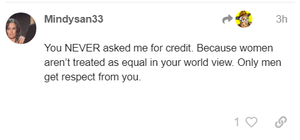Diary (June 14, 2020): Difference between revisions
| Line 35: | Line 35: | ||
Those who love me will forgive my grief. Those who do not forgive my grief are no friends of mine. | Those who love me will forgive my grief. Those who do not forgive my grief are no friends of mine. | ||
==== Attribution versus credit ==== | |||
In the course of my work I use the terms attribution and credit. These are not synonymous. | |||
By ''attribution'', I mean who said what (and where, and when). I generally follow Wikipedia's conventions for attributions. This usage of attribution is characterized by the idiomatic phrase "credit where credit is due", but do not conflate the ideas of attribution and credit. | |||
By ''credit'', I mean the recognition I give to the author of a quotation after using the quotation as the basis for an original work of my own, such that the quotation is no longer distinguishable within my work. | |||
For example, user ludd wrote some goofy ideas which I liked and saved. What next? | |||
* I attribute the quotation to user ludd, because one attributes what one documents. That much is fundamental to chronicling. | |||
* If I subsequently, say, write a short story based on user ludd's ideas, then I will give credit such as "based on an idea by ludd". | |||
== In the News == | == In the News == | ||
Revision as of 20:14, 14 June 2020
Online diary of Karl Jones for Sunday June 14, 2020.
Previous: Diary (June 13, 2020) - Next: Diary (June 15, 2020)
Diary
Ely report
Sun shiny blue sky puff of white what a day to clean up the yard.
Update: took down the section of fence in back where the mini-backhoe will enter the yard to dig the trench for my new improved sewer line (and power and water and data to the garage, and sewer line from the garage; the whole shebang!).
Farewell Boing Boing
In a reflective moment, Jones wrote: "This [my user ban] has nothing to do with SS Minnow, or the thread where I developed Minnow. It's a private feud of my own making."
See Farewell Boing Boing.
Those who love me will forgive my grief

I recently received a reply comment from user Mindysan33 on the Boing Boing comment board.
The comment reads:
You NEVER asked me for credit. Because women aren’t treated as equal in your world view. Only men get respect from you." Comment @ Boing Boing
User Mindysan33 is correct: I never asked for credit, or more properly attribution, when I quoted a portion of Mindysan33's post about Pat Roberts.
I am not required by law to ask permission when accurately quoting the post of an online user made in a publicly visible forum. Usually I do ask permission, because asking is the what friends do, asking is courteous.
But this time I quoted the horrible hateful violent words of an accurately self-defined "humorless boorish" online user. I then replied with my reasoned and heart-felt prayer for love — at a time when I was grieving for my beloved home town of Minneapolis, which was erupting in riots and being systematically raped by organized gangs of young men in plateless cars and automatic weapons and caches of gasoline.
Those who love me will forgive my grief. Those who do not forgive my grief are no friends of mine.
Attribution versus credit
In the course of my work I use the terms attribution and credit. These are not synonymous.
By attribution, I mean who said what (and where, and when). I generally follow Wikipedia's conventions for attributions. This usage of attribution is characterized by the idiomatic phrase "credit where credit is due", but do not conflate the ideas of attribution and credit.
By credit, I mean the recognition I give to the author of a quotation after using the quotation as the basis for an original work of my own, such that the quotation is no longer distinguishable within my work.
For example, user ludd wrote some goofy ideas which I liked and saved. What next?
- I attribute the quotation to user ludd, because one attributes what one documents. That much is fundamental to chronicling.
- If I subsequently, say, write a short story based on user ludd's ideas, then I will give credit such as "based on an idea by ludd".